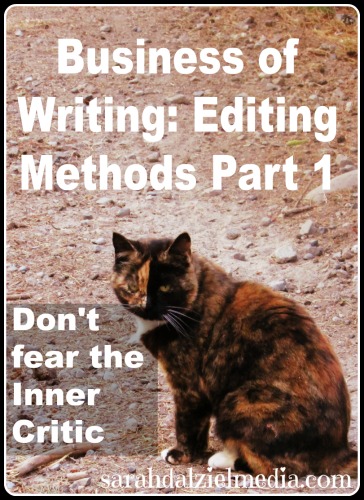Every author in the business will say “get a professional editor” or “at least a proof-reader” before you publish a novel or book. However, there are author edit methods that make the professional proof-reader’s job far easier, if not almost unnecessary. If you’re afraid of missing something, remember, even Tolkien’s Lord of the Rings has a few editing goofs. So one spelling or editing goof up is not the end of the world.
As a writer, I like doing my own edits before publishing anything. That includes blog articles, and sometimes even my Facebook and Twitter posts. For longer works, including some blog articles and my novels, I will do three edits. The first edit is what I call a “working edit” it is the edit I do while still writing an article or story.
Now, there are two camps when it comes to working and writing one’s first draft. One of those camps says “don’t edit at all and just write” while the other says “read what you wrote yesterday at the start of your session and make the minor edits, then write new content once know where you are.”
I subscribe to both of these camps, which method I practice depends on the time of year. In November, April, and July I subscribe to the “don’t touch the edits camp” as I work through NaNoWriMo and Camp NaNoWriMo. The rest of the year, I prefer re-reading what I wrote the day before and making the minor spelling and grammar edits before beginning the next day’s writing. Usually because I’m only aiming for 1000 new words a day, but in NaNoWriMo I’m aiming for 1,667 so need to maximize the writing part of my writing time. 
I find that this method helps me fix the pesky red lines, and lets me find my place in the story without having to do a lot of mental gymnastics.
How to Do a Working Edit:
First, understand that this is not a perfectionist edit. This is a “read for location and catch spelling while doing so” edit. When doing this, I set a timer. It should take only 15 minutes to go through what I wrote yesterday and find where I am, fix the obvious spelling and grammar things, and get started writing. I try and average 100 words a day, so sometimes it will take longer than 15 minutes if I wrote more than that.
What I look for during a working edit is those pesky red lines in Word, and anything that is grammatically off. Doubled words, wrong tense in a sentence, and wrong character speaking are all fair game for a working edit to change.
What is not fair game is re-writing dialogue, settings, or scenes in any way, shape, or form. This edit is a one or two word change, or adding a sentence here or there, not complete paragraph changes or adding entire scenes.
When a Working Edit Doesn’t Work:
If you find you cannot start a working edit without wanting to make major changes. Like, let’s re-write this dialogue, and you cannot resist the urge to make these changes. Then maybe this style of working edit will not work for you.
In NaNoWriMo, I will sometimes do a working edit and sometimes I will not due to time constraints. For a working edit after NaNoWriMo, I will simply read everything I’ve written and focus on fixing all spelling and obvious grammar mistakes. After I’ve read everything once, I will also make notes for use in the second edit.
Working Edits for Non-Writers:
Yes, even people who do not identify as writers can use a working edit. How many times have you made a social media post and ended up with a spelling mistake? Social media posts, creating memes, and anything else that is hard to change after you press “send” are all fair game for basic editing.
For non-novel writing, anything from a blog post to a Facebook comment. A working edit is those 5-10 seconds you spend re-reading what you wrote before you press “post.” While you can edit your posts in some networks, such as Facebook, people can still see the pre-edit version if they decide to look!
So, when writing anything, always do a quick edit. It only takes a few seconds to re-read a comment before sending it.
What do you Think?
If you have ever tried a working edit, what did you think of it? How many edits do you do before publishing something?

Leave a Reply